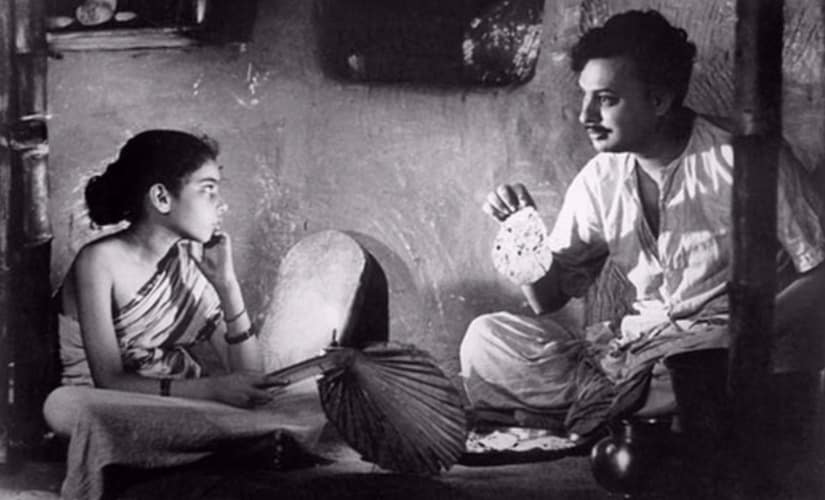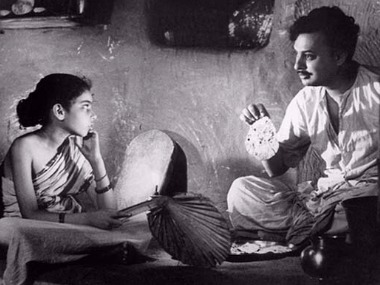Editor’s note: In a prolific career spanning nearly four decades, Satyajit Ray directed 36 films, including feature films, documentaries and shorts. His films have received worldwide critical acclaim and won him several awards, honours and recognition — both in India and elsewhere. In this column starting 25 June 2017, we discuss and dissect the films of Satyajit Ray (whose 96th birth anniversary was this May), in a bid to understand what really makes him one of the greatest filmmakers of the 20th century. In 1961, Ray directed Teen Kanya (Three Daughters) — an anthology of three films adapted from three short stories written by Rabindranath Tagore, as a tribute to the great man on the occasion of his birth centenary. Each film in the anthology told the story of a girl or a woman. In the segment titled Postmaster, Ray tells the beautiful and heart-wrenching story of a 12-year-old orphan servant girl named Ratan. The story of Postmaster is simple. When a new postmaster arrives in the village, he finds it extremely difficult to leave his usual urban life behind and overcome the many day-to-day hindrances of a rural existence. His evenings are extremely lonely, the post office rather secluded and surrounded by large trees and wild bushes. Amidst the sinister yelps of the foxes and the continuous rantings of the village loony, he finds it almost impossible to have a good night’s sleep. His only solace is his servant — a young girl named Ratan — who gives him company and keeps him engaged in conversation, thus distracting him from his fears and worries. Although the postmaster distrusts her at first, the orphan girl soon wins him over. The good-natured postmaster treats her with love and respect — something that she is not accustomed to, thanks to the ill treatment and physical abuse that she has received from her previous masters. She soon finds a deep emotional connect with the ‘Notun Babu’ — her ‘new master’. [caption id=“attachment_3997589” align=“alignnone” width=“825”]  Still from Satyajit Ray’s Postmaster, an adaptation of Rabindranath Tagore’s story of the same name[/caption] Eager to learn, her bond with her master is strengthened further when he begins to teach her how to read and write. And before you know it, she makes the mistake of assuming that she is an integral and inseparable part of her master’s life. When the postmaster is attacked by a nasty bout of malaria, Ratan nurses him back to good health. But little does she know that her master has already made up his mind to quit his job and return to the city — leaving her behind. Devastated to learn the truth, Ratan breaks down at first, but soon picks up the pieces and is seen serving her ‘Notun Babu’ — yet another new postmaster of the village, because that is her barren destiny, something that a brief shower of love is not going to change. As with all his films set in a rural backdrop, Satyajit Ray’s depiction of the village of Ulapur in Bengal is incomparable. So is his portrayal of the typical villagers. The camera lingers lovingly along the muddy village path surrounded by wild outgrowths of vines and shrubs. There is a pond nearby, and the postmaster’s initial enthusiasm of taking a dip in the cool waters is soon crushed ruthlessly when he stumbles upon a snake skin lying on its banks. The village madman is a ragged looking unkempt old man, complete with a fishing rod under his armpit and an angler’s cap on his head, who marches in military style on entirely wrong beats. The relatively saner and more educated villagers gather at the post office to see the wonder that the new postmaster is — a man who has the habit of writing poetry and reading English novels of Scott, among others. In a bid to impress the all-important man, they even invite him to an evening of music recitals — which turns out to be a rather amateurish, cacophonic and unintentionally comic affair. And amidst all this, there’s Ratan. In the beginning, the postmaster treats Ratan with harmless neglect. In a heart-warming scene, Ratan points out to a family photograph of the postmaster and asks who the young girl in the picture is. On learning that she is her master’s sister and is a good singer too, she seems to feel a sudden pang of envy, and quickly breaks into a song herself. Beautifully shot, the scene shows the postmaster’s face, his eyes shut in inattention as we hear the soulful voice of young Ratan, until a time comes when even the postmaster cannot neglect her ungroomed, untrained and yet extremely admirable sense of music. In adapting Postmaster for the screen, Ray made several changes to the story by Rabindranath Tagore — adding quite a few comic elements. But the one big change he made was that of the ending. In the original story, Ratan is shown to fall at her master’s feet, begging him to take her along with him to the city. Whereas in the film, she simply walks past her old master wiping her tears, even as he tries to stop her to give her a few annas in tip. In an interview, Ray was asked why he had made this change, to which the filmmaker simply said that he had felt that the original would have looked rather ‘Victorian’ on screen, going on to add that the audience accepted the change with open arms, as was evident from the success of the film. Anil Chatterjee plays the well-meaning postmaster with remarkable dexterity. He is loving and caring, and yet, not once does it occur to him that young Ratan has become emotionally dependent on him. And when the realisation does dawn upon him, he lacks the courage to walk back to the post office and take Ratan along with him. Chandana Banerjee plays young Ratan with such simplicity and natural flair, that it’s literally impossible to take your eyes off her. It would perhaps not be incorrect to say that she was one of the best child actors Satyajit Ray had ever worked with, tugging at our heartstrings with every smile, every twitch of her expressive eyes and every single teardrop she shed. In what is perhaps the most beautiful scene of the film, the postmaster asks 12-year-old Ratan about her mother, to which she simply says — “She died," adding moments later, “when I was a child.” Bhaskar Chattopadhyay is an author and translator. His translations include 14: Stories That Inspired Satyajit Ray, and his original works include the mystery novels Patang, Penumbra and Here Falls The Shadow.
In Postmaster, Satyajit Ray tells the beautiful and heart-wrenching story of a 12-year-old orphan servant girl named Ratan
Advertisement
End of Article


)
)
)
)
)
)
)
)
)



